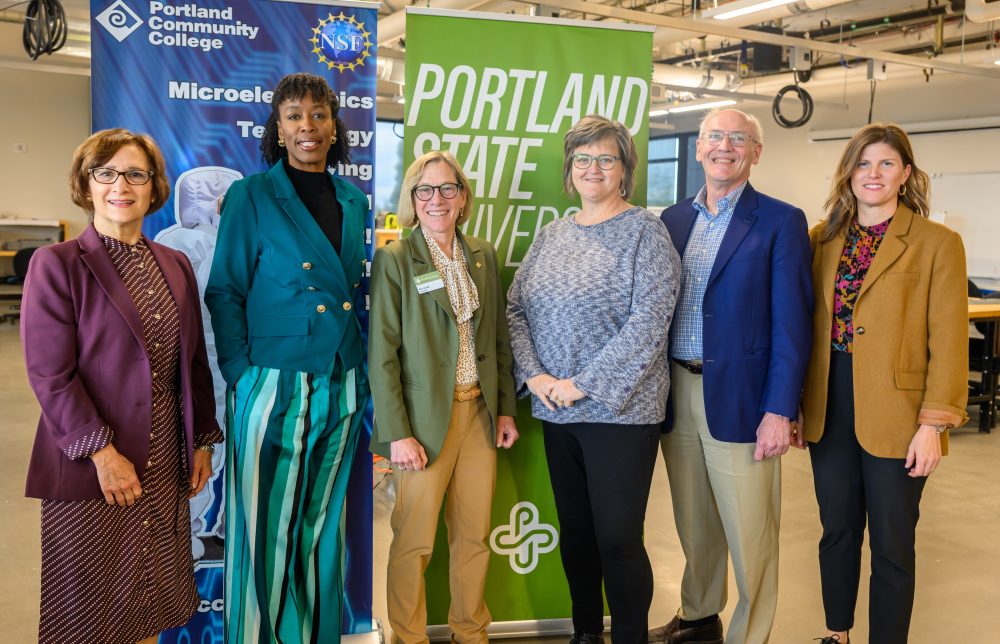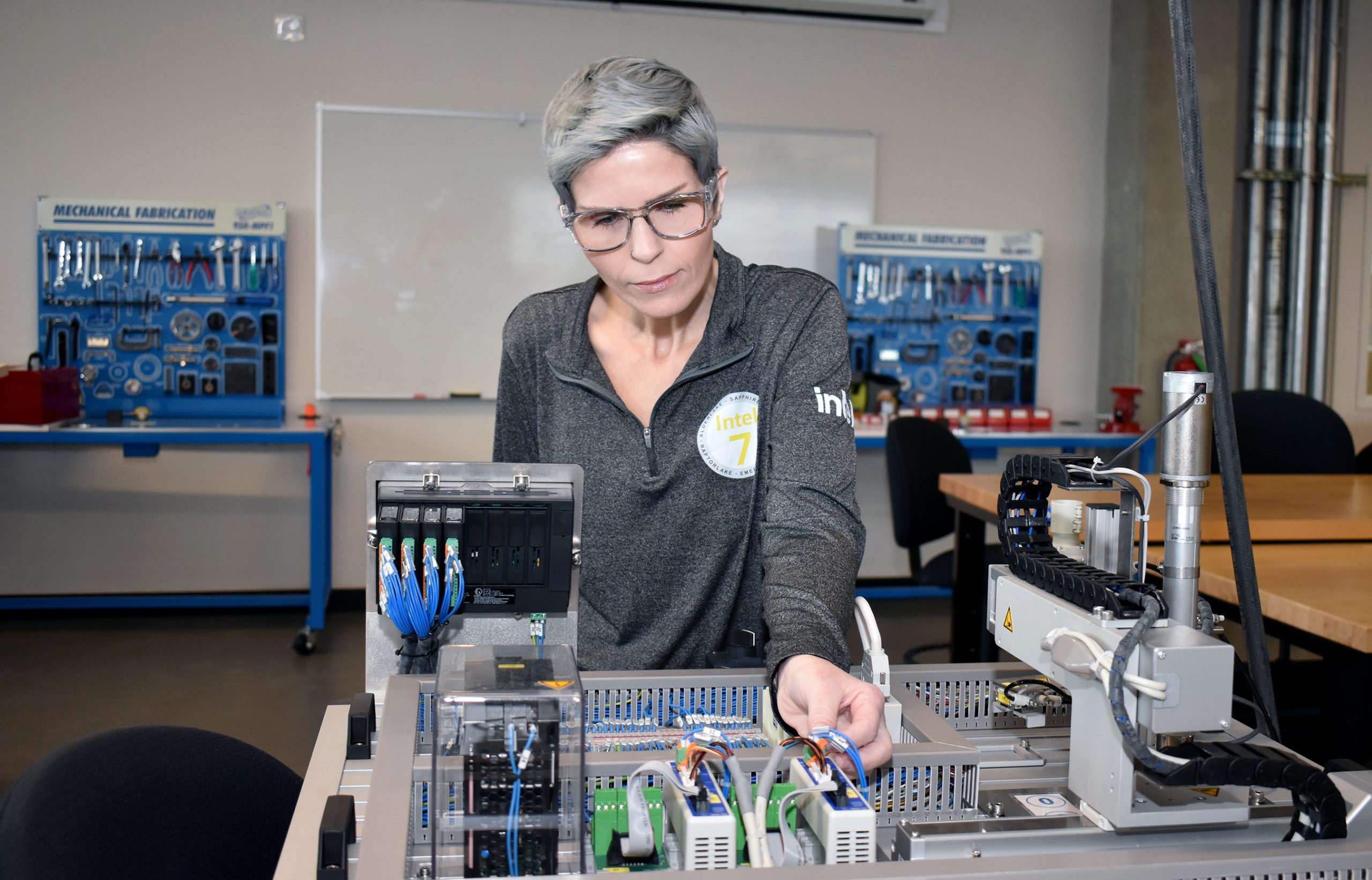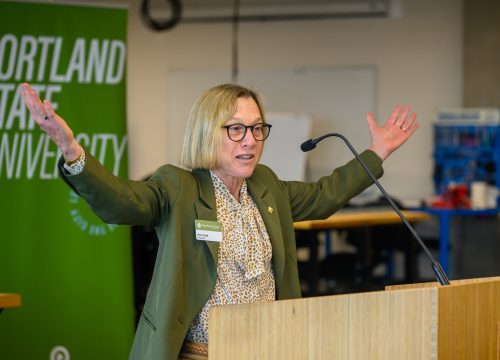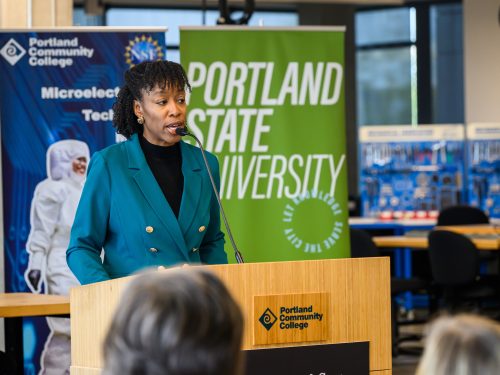PCC, PSU launch initiative to boost Oregon’s semiconductor workforce
Story by James Hill. Photos by Ric Getter.

From left, on hand for the MOU signing were Congresswoman Suzanne Bonamici, PCC President Adrien Bennings, PSU President Ann Cudd, State Sen. Janeen Sollman, Oregon Business Council’s Duncan Wyse and Intel’s Courtney Martin.
Portland State University and Portland Community College announced a groundbreaking partnership to address the critical workforce needs of Oregon’s semiconductor industry.
The Microchip Industry Collaborative for Research, Outreach, Training, and Education Coordination (MICRO-TEC) initiative marks a significant step toward elevating Oregon’s position in the semiconductor sector and supporting the state’s economic growth. PSU and PCC both received appropriations from the state legislature related to semiconductor workforce development following the 2024 session. These funds from the state will support a number of activities, including the ability of the two institutions to partner on this initiative to strengthen workforce pipelines to diversify and sustain the semiconductor industry in Oregon. Both institutions have also received federal funds to support semiconductor talent and workforce development.
MICRO-TEC will create streamlined educational pathways for STEM students, offering a continuum of training from PCC’s foundational programs to PSU’s advanced degrees. This collaborative effort is designed to equip graduates with the skills and knowledge needed to thrive in the dynamic semiconductor industry, which is experiencing rapid growth and technological advancements.

Semiconductor Training
PCC has built a healthy semiconductor pathway to address the worker shortage. From short-term introductory courses to the industry offering programs like Quick Start to two-year degrees in microelectronics and electronic engineering, PCC offers many options to learn the principles of advanced manufacturing that provide pathways to living wage jobs and long-term careers in semiconductors.
“At PCC, we have a proud legacy of training Oregonians for semiconductor and advanced manufacturing careers,” said PCC President Adrien Bennings. “Our programs offer multiple pathways, from short-term certificates to full degrees, all leading to living wage jobs. This partnership with PSU through the MICRO-TEC initiative enhances these opportunities, opening new doors for students from all backgrounds to succeed in the dynamic semiconductor industry.”
The initiative strongly emphasizes diversity, equity and inclusion, aiming to broaden participation by students from all backgrounds in STEM fields. MICRO-TEC will implement targeted outreach and support programs to engage underrepresented groups, from K-12 through higher education. These efforts include specialized mentoring programs, scholarships and inclusive teaching practices designed to create a welcoming environment for all students.
“By focusing on inclusivity and providing the support systems students need, we’re making sure that Oregon’s tech workforce reflects the rich diversity of our communities,” Bennings continued. “MICRO-TEC is about more than filling jobs; it’s about empowering individuals to shape the future of technology and positioning Oregon as a leader in innovation and workforce development.”
A key feature of MICRO-TEC is its close collaboration with industry partners. This alignment ensures that the curriculum remains cutting-edge and responsive to industry needs, enhancing students’ job readiness upon graduation. The initiative will also expand work-integrated learning opportunities, including internships, cooperative education and apprenticeship programs. These hands-on experiences will provide students with practical skills and industry connections, significantly boosting their employability.
“MICRO-TEC represents a transformative approach to workforce development,” said PSU President Ann Cudd. “By combining PSU’s research expertise with PCC’s technical training excellence, we’re creating a comprehensive educational ecosystem that will nurture the next generation of semiconductor professionals. This partnership exemplifies our commitment to innovative education that directly addresses industry needs and prepares our students for high-demand careers. MICRO-TEC is more than an educational initiative; it’s a catalyst for economic development and technological advancement in our state.”
MICRO-TEC’s scope extends beyond higher education, with plans to engage K-12 students through outreach programs designed to spark early interest in STEM and semiconductor careers. These programs will include interactive workshops, summer camps, and school visits, introducing young students to the world of microchips and inspiring the next generation of tech innovators.
PCC’s manufacturing pathways offer diverse routes for student success, from dual-credit programs to workforce training certificates and associate degrees. With 44% of semiconductor jobs requiring these credentials, PCC is key in ensuring students are prepared for high-wage, in-demand careers. This partnership unites PCC’s technical training with PSU’s advanced research to create seamless educational pathways that will equip students with the necessary skills to succeed in the high-demand semiconductor sector.

President Cudd said PSU’s research expertise combined with PCC’s technical training excellence is a win-win.
The initiative aligns with national goals for advancing American microchip development and manufacturing leadership, positioning Oregon as a key player in this critical industry.
For three decades, PCC has worked with industry partners like Intel to design curriculum that meets workforce needs, boasting a nearly 100% placement rate for the college’s Microelectronics Technology degree. President Bennings said this partnership recognizes the importance of continuing this work. PCC and PSU will work with industry, government, and community partners to continue to foster innovation, workforce readiness, and economic growth, positioning Oregon as a leader in the semiconductor field.
As MICRO-TEC launches, both presidents expressed enthusiasm for the collaboration’s potential to drive innovation, economic growth, and educational excellence in Oregon’s semiconductor landscape. The partnership will yield significant benefits for students, industry, and the broader community, reinforcing Oregon’s reputation as a hub for technology and innovation.
Learn more about PCC’s Science, Technology, Engineering, and Math (STEM) pathway.

